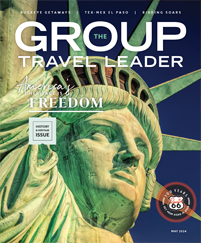You might think that January’s cold drudgeries and brown landscape would be enough to convince someone to daydream their way into taking a vacation.
Yet as more Americans work later in life, many group travel planners may find it challenging to convince employed potential travelers to take a break from the office and sign up for a group trip. Recent studies found that U.S. workers forfeited $52.4 billion in time-off benefits in 2013, and took less vacation time than at any point in the past four decades.
Use science to combat this trend with these recent studies that you can bring up in your travel promotional materials or face-to-face to persuade new members to break free of the winter cold and book their next vacation with you.
Scientific Reasons to Travel
1.) Travel will help you live longer.
What could be more convincing than this literal life-changer? According to one study, men at risk for heart disease were 30 percent more likely to have a heart attack when skipping vacation for five years in a row than those who took off a week each year. Women similarly who took days off only once every six years were almost eight times more likely to develop heart issues than those who took two vacations a year.
2.) Travel increases productivity.
You might think that vacation time would decrease a company’s ultimate productivity. However, according to recent studies, vacations can increase an employees performance by 80 percent. To clench it, an Oxford Economics report found three quarters of workers surveyed felt recharged after a vacation, half felt more focused and 40 percent felt less stressed.
3.) Travel sharpens the mind.
Many studies have shown a correlation between a relaxed brain and processing new information. Mental downtime achieved during vacation allows the brain to work on essential tasks, such as memorizing new skills you may have learned the week before.
A study by the Global Commission on Aging and Transamerican Center for Retirement Studies (GCATCRS) also found that those who frequently travel have lower incidence of dementia. Another benefit occurs from the cognitive stimulation caused from visiting a new location, which a scientific report revealed increased a person’s mental capacity.
4.) Travel decreases depression.
It may seem basic, but science proves that travel not only makes you happy, but also protects you from being unhappy. Another study by GCATCRS discovered that people who travel experience fewer down days and less stress.
5.) Travel improves creativity.
Workers concerned with taking vacation time can take comfort in the fact that when they return, their can enjoy a boost in creativity. Allowing time for daydreaming produces better problem solving skills and ideas outside the box, according to a recent report. It takes the brain away from its daily task mode, and allows the mind to look at a common issue from a new vantage.
6.) You will help the economy.
An Oxford Economics study revealed the economy would gain $160 billion in total business sales and $21 billion in tax revenues if American workers took all of their paid time off. So when convincing someone to travel, be sure and say, “If you won’t travel for yourself or your company, travel for your country.” Patriotism will surely give them enough of a push to enjoy themselves on your next group tour.









